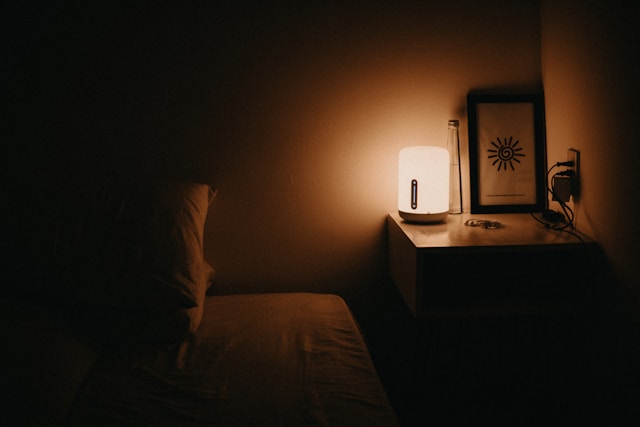1. Set a Consistent Bedtime
Going to bed at the same time every night helps regulate your body’s internal clock. Aim for 7-9 hours of sleep and stick to a consistent schedule, even on weekends.
2. Limit Screen Time

Photo by Daniel Fontenele on Unsplash
Avoid screens at least an hour before bed. The blue light emitted by phones, tablets, and computers can interfere with your sleep. Instead, opt for activities like reading or listening to music.
3. Create a Relaxing Environment
Make your bedroom a calming space. Keep it cool, dark, and quiet. Consider using blackout curtains, a white noise machine, or earplugs to create an ideal sleep environment.
4. Practice Deep Breathing
Spend a few minutes doing deep breathing exercises to relax your mind and body. Inhale deeply through your nose, hold for a few seconds, and exhale slowly through your mouth.
5. Read a Book
Reading a book can help you unwind and distract your mind from the stresses of the day. Choose something light and enjoyable to avoid stimulating your brain too much before bed.
6. Take a Warm Bath or Shower
A warm bath or shower can help relax your muscles and prepare your body for sleep. The drop in body temperature after getting out of the bath or shower signals to your body that it’s time to sleep.
7. Write in a Journal

Photo by Hannah Olinger on Unsplash
Spend a few minutes writing down your thoughts, reflections, or a list of things you’re grateful for. Journaling can help clear your mind and reduce anxiety, making it easier to fall asleep.
8. Practice Gentle Yoga or Stretching
Gentle yoga or stretching can help release tension in your muscles and promote relaxation. Avoid vigorous exercise close to bedtime, as it can have the opposite effect.
9. Listen to Calming Music or Sounds
Listening to calming music, nature sounds, or a guided meditation can help you relax and prepare for sleep. Create a playlist of soothing sounds that help you unwind.
10. Limit Caffeine and Alcohol

Photo by Mike Kenneally on Unsplash
Avoid consuming caffeine and alcohol in the evening, as they can interfere with your sleep. Opt for herbal teas or warm milk instead.
11. Prepare for the Next Day
Spend a few minutes preparing for the next day. Lay out your clothes, pack your bag, and make a to-do list. This can reduce morning stress and help you feel more organized.
12. Practice Gratitude
Reflect on the positive aspects of your day by writing down a few things you’re grateful for. This practice can shift your focus to positive thoughts and improve your overall mood.
13. Avoid Heavy Meals Before Bed
Eating a heavy meal close to bedtime can disrupt your sleep. If you’re hungry, opt for a light snack like a piece of fruit or a handful of nuts.
14. Use Aromatherapy

Photo by Towfiqu barbhuiya on Unsplash
Certain scents, like lavender and chamomile, can promote relaxation and improve sleep quality. Use essential oils, candles, or a diffuser to fill your bedroom with calming aromas.
15. Limit Fluid Intake
While staying hydrated is important, try to limit your fluid intake in the evening to avoid waking up frequently during the night to use the bathroom.
16. Turn Down the Lights

Dim the lights in your home as you approach bedtime. Lower light levels signal to your body that it’s time to wind down and prepare for sleep.
